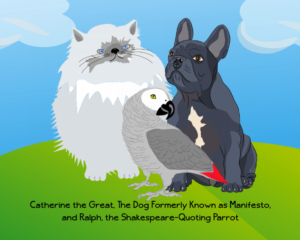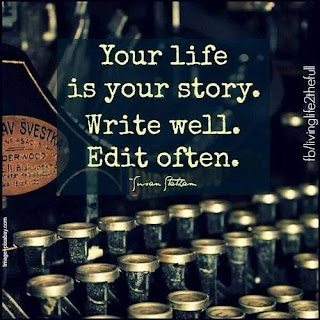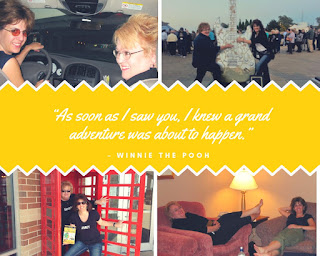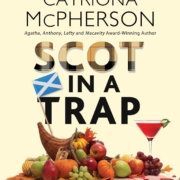How Intelligent is Artificial Intelligence?
 By Lois Winston
By Lois Winston
AI is here to stay, and there is much to worry about. For instance, we’ve all heard about the scams where bad actors contact people and demand ransom for a kidnapped relative. Too many people act out of fear before thinking and wind up losing huge sums of money. Thanks to AI, scammers can now clone the actual voice of the “kidnap victim.”
Writers are worried they’ll become obsolete, that in the future AI will take over publishing. After all, if publishers can use AI to churn out novels, why pay authors? I wondered if authors’ fears are truly founded. So I decided to conduct an experiment. I went on ChatGPT and told it, “Write a manuscript in the style of the Anastasia Pollack Crafting Mysteries by Lois Winston.”
Artificial Intelligence is supposed to be able to analyze text and produce a new work in the style of the author. There are currently eleven Anastasia Pollack Crafting Mysteries and three novellas. First chapters and back cover copy are widely available online, both on e-retailer sites and my own website. It didn’t take AI long to churn out several chapters. Here’s the beginning of a book created by ChatGPT:
Murder and Mayhem in the Crafting World
Chapter One
Anastasia Pollack had been up since dawn, frantically stitching together a wedding dress for her best friend’s daughter. As a professional crafter and owner of the American Woman magazine’s crafting column, Anastasia was used to tight deadlines, but this one felt especially pressing. After all, she couldn’t let her best friend down, and she wanted everything to be perfect for the big day.
In the first sentence, there are glaring errors. I write in first person, not third person. How intelligent is ChatGPT if it couldn’t even discern this? Anastasia is the crafts editor at a women’s magazine. She’s not a “professional crafter,” and she doesn’t “own” a crafting column in a magazine.
It got worse:
Just as she finished the final stitches, her phone rang. It was her mother, who never called before noon.
“Anastasia, darling,” her mother’s voice came through the phone, “I need your help.”
Anastasia sighed, knowing that her mother’s definition of “help” was very different from her own. “What do you need, Mother?”
“It’s your uncle. He’s in trouble again.”
Anastasia’s heart sank. Uncle Ralph was always getting himself into some sort of scrape or another. “What kind of trouble?”
UNCLE Ralph? Ralph is a Shakespeare-quoting African Grey parrot! He makes his appearance on Page 4 of Assault with a Deadly Glue Gun, the first book in the series. ChatGPT scanned enough to know Ralph was a character but wasn’t smart enough to know the difference between a human and a bird.
I won’t bore you further, except to say that ChatGPT also came nowhere close to capturing my voice. I write humorous amateur sleuth mysteries. Anastasia is a Jersey girl with a Jersey girl’s outlook on life. Publisher’s Weekly compared her to Tina Fey’s Liz Lemon from Thirty Rock, and Kirkus Reviews called her, “North Jersey’s more mature answer to Stephanie Plum.” ChatGPT obviously isn’t intelligent enough to understand and duplicate humor beyond the standard Knock-Knock joke.
Not to mention the fact that “mediocre” would be a generous description of the writing ChatGPT produced. I worked for a literary agency for a dozen years. If someone had submitted Murder and Mayhem in the Crafting World, it would have received a swift rejection letter.
However, perhaps I was partly at fault. I had asked the AI to write a manuscript “in the style” of my series. What would happen if I tried again, this time saying, “Create a book in the Anastasia Pollack Crafting Mystery Series by Lois Winston”?
The results were no better:
A Deadly Yarn in the Anastasia Pollack Crafting Mystery Series
Chapter 1
Anastasia Pollack had been expecting a normal day at the office. She was going through the piles of paperwork that had accumulated on her desk when she received a call from her son, Alex.
“Mom, I need you to come to the yarn store. I think something’s wrong.”
Anastasia’s heart skipped a beat. She knew Alex wouldn’t call her unless it was something serious.
“I’m on my way,” she replied, grabbing her coat and keys.
When she arrived at the yarn store, she saw Alex standing outside with a group of people. He ran up to her as soon as he saw her.
“Mom, thank God you’re here,” he said, his eyes wide with worry. “It’s Catherine. She’s dead.”
Anastasia’s heart sank. Catherine was one of her closest friends and employees at the store. She couldn’t believe that she was gone.
As she flipped through the pages, she realized that Catherine had been keeping a diary. The entries were cryptic, but Anastasia could tell that something was bothering her friend.
Once again, ChatGPT had created a third person narrative. Once again, Anastasia is NOT a shop owner. And once again, ChatGPT wasn’t intelligent enough to tell the difference between a human and an animal.
In my series, “Catherine” is not Anastasia’s best friend. Her best friend is Cloris McWerther, the food editor at the magazine where they both work. “Catherine” is Catherine the Great, her mother’s cat.
Catherine the Great doesn’t show up until Chapter Five in Assault with a Deadly Glue Gun, but the AI had scanned enough of the text to find her name. If it were really intelligent, it would have picked up on the fact that she’s a four-legged creature, especially since she’s introduced as “Catherine the Great, my mother’s extremely corpulent white Persian cat.”
All ChatGPT would have had to do is scan any of my books’ Amazon pages where it would have found a large illustration of all three pets in the Pollack household. I’m wondering, if I tried a third experiment, would ChatGPT morph Anastasia’s mother-in-law’s French bulldog into yet another human? I decided not to waste my time.
Post a comment for a chance to win one of several promo codes I’m giving away for a free download of the audiobook version of Decoupage Can Be Deadly, the fourth book in my Anastasia Pollack Crafting Mystery Series.
~*~
USA Today and Amazon bestselling and award-winning author Lois Winston writes mystery, romance, romantic suspense, chick lit, women’s fiction, children’s chapter books, and nonfiction under her own name and her Emma Carlyle pen name. Kirkus Reviews dubbed her critically acclaimed Anastasia Pollack Crafting Mystery series, “North Jersey’s more mature answer to Stephanie Plum.” In addition, Lois is a former literary agent and an award-winning craft and needlework designer who often draws much of her source material for both her characters and plots from her experiences in the crafts industry. Learn more about Lois and her books at her website www.loiswinston.com where you can also sign up for her newsletter and follow her on various social media sites.









Wow! What can I say? This is scary.
Scary but also funny in a way, Kathleen. It’s falls more into the realm of all the erroneous information that has proliferated across the internet from the beginning. A human reading the blurbs of any of my books in the series could have come up with a more accurate story for another book.
Very scary stuff. Thank you for doing the samples.
Mary
Mary, it proved to me that at this point A.I. isn’t very I.!
That is scary stuff and thanks for posting. Recently an author I’ve long followed — he was one of the first authors to try to guide me on my path to publication many years ago — released all his books in audio using Google Play’s AI. The narration is terrible, but it was more that he would actually do something like that, taking away potential income from a narrator. Sure, you and I both use royalty share and there are no guarantees but it’s just disheartening to think he supported AI translation. Anyway, I’ve unfollowed him, though I’m sure he won’t care.
Judy, I can’t imagine that anyone listening to one of his audiobooks would go on to listen to another if the narration was as bad as you say. Sounds like he wasted his time.
Lois, this is a great posting and an excellent test of AI capabilities. I agree that ChatGPT makes a lot of mistakes, and the reason is that the way it’s programmed, only about 75% to 85% of what it writes is factual or accurate. However, the scary part is that AI is already making inroads into offices and students are using AI to “write” their essays and term papers.
What authors need to consider is that anything written by AI is not original work and therefore, it is not legal to register the copyright. It is also a breach of contract with an author’s publisher to present AI generated material as being the author’s original work. There will be lawsuits for sure.
Kathryn, we definitely need the law to catch up with technology. Kids have been cheating on essays and term papers for longer than computers have been around. Remember Cliff Notes? I understand that many teachers and professors now run their students’ work through a program that will show if the work has been cribbed from the Internet. Someone will need to come up with a program (if there isn’t one already) for doing the same for AI generated works.
Cheaters are always going to find ways to cheat. Lawsuits will help, but lawsuits are costly. Years ago, I discovered that magazines in South America, GB, and Europe were copying designs I’d sold to several different magazines. The cost for the publisher to hire an international copyright attorney to go after these foreign publishers would have been prohibitive. So they got away with stealing, and some of them probably continue to do so.
What a good example …. funny, but absolutely frightening.
Debra, what it told me is the I in AI stands for idiot!
I was playing with chatGPT, gave it the opening premise of a novel that’s only in my head now, and asked it why the main character had mysteriously disappeared. First reply was to the effect that it cannot comment on current events. I replied that this was fiction, and then it gave me three obvious reasons for the disappearance and went on to say a good novelist could develop any one of these possibilities, etc. The way I read the response was that it was telling me to go write my own book!
Now, that’s funny, Judy!
Scary stuff, for sure!
Sure is, Lynn!
I enjoyed reading your post, Lois, but I couldn’t help thinking of the segment about AI on Sixty Minutes recently. What have we done, humans, inventing machines that can think and learn and work without breaks, without eating or sleeping? It is estimated that within a few years AI will put more than twenty million Americans out of work.
I hope we have some guardrails in place before that happens, Saralyn. I have visions of everything from Wall-E to Battlestar Gallactica going through my mind right now.
A truly interesting post on a relevant topic. It might spew out words, but it doesn’t capture your voice, that’s for certain. Thanks for going the extra mile with this and giving those examples, Lois. Exactly where we’re heading with this is a mystery.
Thanks, Mickey! Where we’re headed is both a mystery and a worry. If AI can make so many problems generating a story for an existing series, how can we be sure its use in fields with far more serious repercussions won’t be full of errors?
Interesting! AI needs more technical work it’s scary stuff! Thanks for sharing the samples.
Thanks for stopping by and commenting, Vivienne!
That is interesting! I’m not a fan of AI, just because I don’t think artificial intelligence can ever match up with the human brain. There are too many “what if’s” just like it picking up on pets rather than people. The cars with AI scare me. I can see more wrecks because people will become too “dumbed down” to know what to do if the car malfunctions. But that’s a whole other thing. Fun post. Keep up the good books!
Thanks, Paty! Those cars scare me, too!
Lois,
Thanks for taking the time to investigate and then share. The results help with anxiety. My fear is that AI will learn from its mistakes and make our world a land of automatons.
AI just told me my writing is on its way to becoming mistake-free. (Dang!)
George
Thanks, George. I think AI only increases anxiety in all of us. Life is scary enough as it is these days. The last thing we need is robot overlords!
Hi Lois,
I’ve used Quickwrite to trigger ideas on character traits and motives, and blog posts, but I can’t imagine ever using something it generates because as you pointed out, it totally doesn’t have any voice at all.
I’ve never heard of Quickwrite, Patricia. My ideas are always triggered by things I see on the news and read about in the newspaper, plus a sprinkling of personal experience. Thanks for stopping by!
Love that it told Judy to write her own books. First brilliant thing I’ve seen come out of AI! Brilliant post, Lois. Sad that human being believe this will benefit humanity. In some cases, maybe, but not the creative process–I’ll write my own books, thank you.
Yes, Donnell, I thought what AI told Judy was brilliant–maybe the only brilliant information to come out of the new technology!
You went above and beyond for this, Lois. If your books weren’t fiction, getting the basic facts wrong would be even more disturbing.
That’s one of the most frightening aspects of AI, Gay. We already have way too much disinformation on the Internet. We don’t need a technology that creates more.